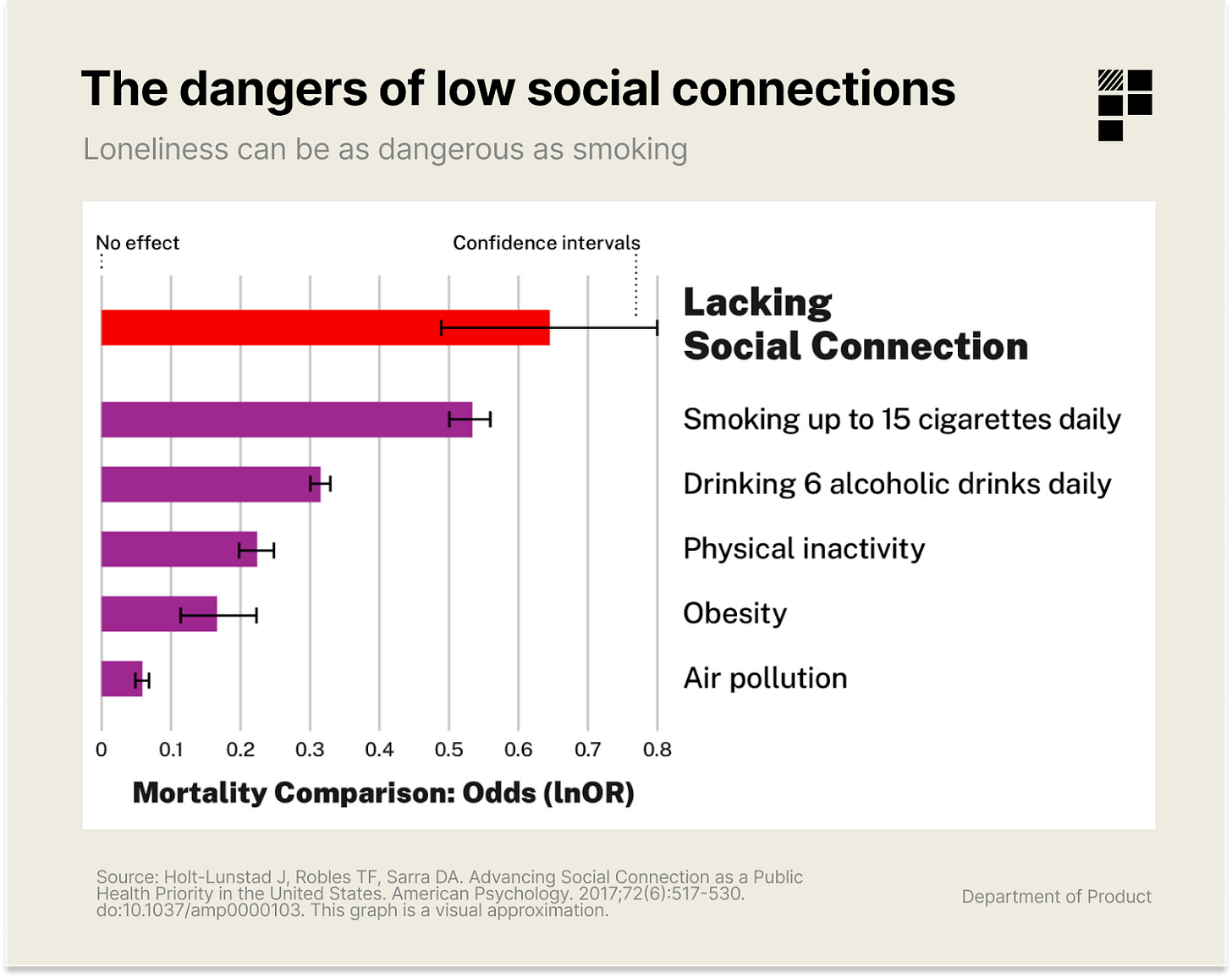DOP Deep: Exploring the loneliness epidemic
Unpacking the new startups emerging to tackle the loneliness epidemic and what product teams can do about it
🔒DoP Deep goes deeper into the stories covered in the Weekly Briefing and are available for paid subscribers. If you’d like to upgrade to receive them you can do so below. Or you can find out more about what you get as a paid subscriber here.
Hi product people 👋,
In last week’s briefing, we mentioned that Tinder’s former CEO has set up a startup which is designed to tackle the new epidemic faced by adults across the world: loneliness.
Meeno is an app that touts itself as a relationship coach and has recently raised a further $3.9 million in funding which takes its total to over $5 million. In a post outlining her vision for the product, Meeno’s CEO Renate Nybord explained that it was during her time at Tinder she first became aware of the surge in loneliness experienced by younger demographics. Meeno is a chatbot designed address loneliness directly by helping users build relationships with the most important people in their lives.
In this DOP Deep dive will take a closer look at the loneliness epidemic and the emerging loneliness economy to understand what’s driving it, what new startups are being built and the opportunities and considerations for modern product teams.
Coming up:
How harmful is loneliness and what’s driving it?
Exploring the loneliness economy and loneliness-oriented startups and products
Opportunities and considerations for product teams
How harmful is the loneliness epidemic and what’s driving it?
According to a report by the US surgeon general, social isolation is as harmful as smoking 15 cigarettes a day. That’s a pretty incredible stat and what’s even more alarming is that loneliness, traditionally associated with older groups, is something which is now also increasingly afflicting the young.
The younger you are, the more likely you are to report that you feel lonely, with 79% of Gen-Z reporting in 2019 that they felt lonely vs. 50% of boomers. The covid pandemic only worsened this and the interesting insight here is that technology seems be one of the core driving factors behind the loneliness epidemic.
The more tech-powered leverage we have as individuals, the less reliant we are on those around us.
Popping to the grocery store has been replaced by DoorDash. Grabbing a car ride with a friend to work or the airport is replaced by Uber. Socialising with friends has been replaced by TikTok feeds of influencers.
It’s not something we tend to think about when we’re deep in the details of setting OKRs or fleshing out roadmaps but the products we’re building are indirectly impacting the loneliness epidemic - and potentially contributing to it.
The prevalence of loneliness vs. other health conditions
When compared with other social and health conditions, a research paper suggests that loneliness is more prevalent than obesity, smoking and other inactivity.
It’s fair to say then, that loneliness is a major problem - and many startups have recognised that it’s a problem worth solving.
Exploring the loneliness economy and new, emerging startups
Over the past few years - and particularly since the pandemic, a new group of loneliness-oriented startups has emerged. Some of these products will be explicit in their desire to tackle loneliness whilst others will focus on the symptoms caused by loneliness - whether or not they consciously realise it.
Here’s a snapshot of some of the products that have recently emerged and how they fit into the so-called loneliness economy:
We can break these down broadly into 5 distinct product categories:
Family life
Neighbourhoods and third places
Friendship
Romance
Work
Let's explore some of these in greater detail.






